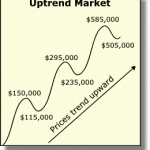Chicago Housing Market Report for 2013
The Chicago Housing Market in 2013, like the rest of the Country, is seeing some dramatic changes. There is no question that real estate in general is on the rebound – increasing prices, lack of inventory and shorter time in the market are shifting the balance from a buyers’ to a sellers’ market.
Chicago Housing Market In 2013:
According to the Illinois Association of Realtors, the Chicago current housing inventory is down 42% from last year at this time. Sales are up 11% and median prices are up 13%. Most of the changes have happened since the beginning of this year and therefore they are seen as quite dramatic. The prices have increased at a rate faster than projected, and that is the main reason of the sharp decline in inventory of properties available.
The suburbs are moving faster than the city area, especially neighborhoods of median home prices of the North West.
It is not unusual to see properties going under contract in a short amount of time and with multiple offers. This has been especially encouraging for new home builders who are seeing an increasing demand in properties and are coming back to building more properties to gap the higher demand.
Another phenomena is that at the same time the number of “underwater” homes (where the mortgage balance is higher than the market value) in the Chicago-area increased at the end of last year and it showed as a spike in short-sales.
Throughout history, the United States real estate market has been following predictable patterns. Most metropolitan areas in the US are in long-term uptrends. History shows that most house prices following uptrend prices will double in 15 to 20 years from previous levels. 
Uptrend markets are generally the markets where there is a steady flow of people moving in and most of the people moving in do so because of available jobs.
Chicago real estate is also seeing an increase of foreign investments. Chicago’s housing market and sizeable inventory has made it one of the leading locations for foreign investors, especially from Canada and Europe.
From a report issued by AFIRE Annual Foreign Investment Survey, Chicago falls into the top 10 US cities for real estate investments for 2013. The other ones being: New York City, NY – San Francisco, CA – Washington, DC – Houston, TX – Boston, MA – Los Angeles, CA – Seattle, WA.
Source: 2013 AFIRE Annual Foreign Investment Survey
What does this mean to the real estate investor?
Warren Buffett has been heavily investing in real estate brokerage companies and his new brand, Berkshire Hathaway HomeServices, will be managed by a joint venture of HomeServices and Brookfield, HSF Affiliates LLC.
His interest in long-term investments falls in line with his business philosophy: “We want to be in the businesses that are going to be very enduring,” Buffett said, “And real estate brokerage operations, they will be here 100 years from now.” He also stated in an interview in November 2012, that if he could he would buy hundreds of single family homes and the only thing stopping him is the management aspect.
Creative real estate investors need a new way of looking at the marketplace.
There is an increasing demand of properties from new and seasoned investors, domestic and foreign. There is also a demand of bulk purchases from US hedge funds investors and foreign capitalists.
On a smaller scale, increase in the rental market requires a larger inventory of rental properties. Long term buyers (landlords) should consider that this is the time to buy properties and lock down the long term investments: lower mortgage interest rates and home prices still at low record prices in history paired with higher rent prices offer a win-win situation.
Investors interested in wholesaling can definitely build a strong buyers’ list compiled of local landlords, rehabbers and foreign investors.
There are still plenty of opportunities to take advantage of this unique situation in the Chicago housing market. Since supply is decreasing dramatically while demand is increasing from home buyers and investors, domestic and foreign, even the less desirable neighborhoods will see a higher demand from investors. The Midwest is experiencing population and economic growth. Because of the financial crisis and continuing economic woes throughout the U.S., Americans are moving from high-tax, high cost of living markets to lower cost regions. Corporate America is also relocating to states with low taxes and costs of living. Chicago is offering the advantages, opportunities and lure of a metropolitan life with the comparable median cost of living among major US cities.
If you would like to network with other investor and keep current on the Chicago Current Housing Market, please join Laura Al-Amery at the Chicago Real Estate Club: Networking and Education Group.
 Subscribe to our podcast
Subscribe to our podcast 

